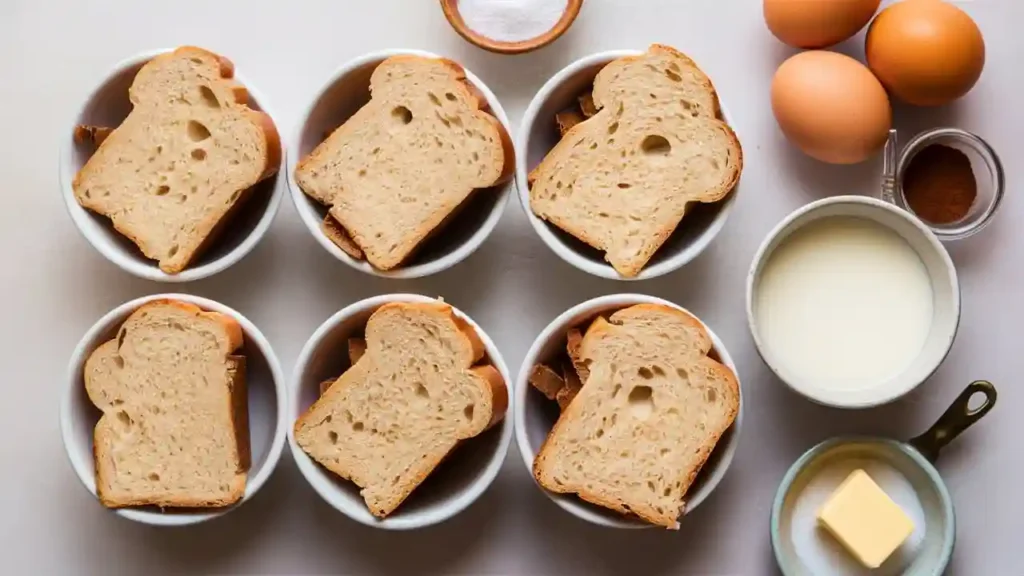Last Updated on April 24, 2025 by Lucas
Craving a breakfast that’s both comforting and effortlessly elegant? This sourdough French toast brings a delightful twist to a classic favourite. The tangy depth of sourdough bread pairs beautifully with a sweet, cinnamon-vanilla custard, creating a harmonious balance of flavours. Its sturdy texture ensures each slice is perfectly crisp on the outside and tender within. Whether you’re using up day-old bread or seeking a special weekend treat, this recipe promises a satisfying start to your day.
Key Benefits
When you prepare French toast using sourdough bread, you’re not just indulging in a delightful breakfast; you’re also reaping several notable benefits. Let’s explore why sourdough French toast stands out:
1. Enhanced Flavour Profile
Sourdough bread introduces a subtle tanginess that beautifully complements the sweetness of traditional French toast. This unique flavour combination elevates the dish, offering a more complex and satisfying taste experience.
2. Optimal Texture
The inherent structure of sourdough bread provides a perfect balance between a crispy exterior and a soft, custardy interior. This texture contrast enhances the overall mouthfeel, making each bite more enjoyable.
3. Digestive Advantages
Sourdough fermentation breaks down phytic acid and other anti-nutrients, which can inhibit mineral absorption. This process not only makes the bread easier to digest but also increases the bioavailability of essential minerals like calcium, magnesium, and iron.[1]
4. Lower Glycemic Impact
Compared to other breads, sourdough has a lower glycemic index, which means it causes a slower rise in blood sugar levels. This can be beneficial for blood sugar management and sustained energy.[2]
5. Resourceful Use of Bread
Sourdough French toast is an excellent way to utilize day-old or slightly stale bread. The firm texture of older sourdough slices absorbs the custard mixture well without becoming overly soggy, reducing food waste and enhancing the dish’s texture.
Incorporating sourdough into your French toast not only enriches the flavour and texture but also offers nutritional and digestive benefits, making it a wholesome choice for your breakfast or brunch.
Ingredients
Creating the ideal sourdough French toast starts with choosing high-quality ingredients. Every element contributes to the flavor and texture you’re aiming for.

| Ingredient | Quantity | Notes |
| Sourdough Bread | 6 slices | Preferably ½-inch thick and slightly stale for optimal custard absorption. |
| Eggs | 3 large | Provide structure and richness to the custard mixture. |
| Milk | ¾ cup | Whole milk is traditional; almond or coconut milk are suitable alternatives. |
| Vanilla Extract | 1 teaspoon | Adds a sweet, aromatic flavor to the custard. |
| Ground Cinnamon | ½ teaspoon | Enhances flavor; also offers antioxidant and anti-inflammatory properties. |
| Granulated Sugar | 1 tablespoon | Optional; adjust to taste for desired sweetness. |
| Butter | As needed | For greasing the pan; imparts a rich flavor and prevents sticking. |
| Salt | A pinch | Balances sweetness and enhances overall flavor. |
Tips for Ingredient Selection:
- Sourdough Bread: Using slightly stale bread helps it absorb the custard without becoming overly soggy, resulting in a better texture.
- Milk Alternatives: If you’re lactose intolerant or prefer a dairy-free option, almond or coconut milk can be used without compromising flavor.
- Cinnamon: Beyond its warm, sweet flavor, cinnamon contains compounds like cinnamaldehyde, which have been associated with antioxidant and anti-inflammatory effects.[3]
- Butter: Choose unsalted butter to better manage the overall salt level in your dish.
By carefully selecting and preparing these ingredients, you’ll set the stage for a delightful sourdough French toast that balances flavor, texture, and nutritional benefits.
Instructions
Creating the perfect sourdough French toast involves a few simple steps. Follow this guide to achieve a delightful balance of crispiness and custardy richness.

1. Prepare the Custard Mixture
In a large mixing bowl, combine the following ingredients:
- 3 large eggs
- ¾ cup milk (whole milk or alternatives like almond or coconut milk)
- 1 teaspoon vanilla extract
- ½ teaspoon ground cinnamon
- 1 tablespoon granulated sugar (optional, adjust to taste)
- A pinch of salt
Whisk these ingredients together until well combined and slightly frothy.
2. Soak the Bread
Place 6 slices of sourdough bread, preferably ½-inch thick and slightly stale, into the custard mixture. Allow each slice to soak for about 2–3 minutes on each side, ensuring they are fully saturated but not falling apart.
3. Heat the Pan
Preheat a skillet or griddle over medium heat. Add a knob of butter to coat the surface evenly. Wait until the butter is melted and the pan is hot before proceeding.
4. Cook the Toast
Gently lay the soaked bread slices on the skillet. Cook for 2–3 minutes per side, until golden and cooked through. Lower the heat if browning too quickly.
5. Serve Warm
Transfer the cooked French toast to plates and serve immediately. Top with your choice of accompaniments such as fresh berries, maple syrup, or a dusting of powdered sugar.
By following these steps, you’ll create a delicious sourdough French toast that’s perfect for breakfast or brunch.
Pro Tips and Variations
Mastering sourdough French toast involves thoughtful choices and subtle enhancements. These insights will help you elevate your dish while accommodating various dietary preferences.

Bread Selection: Embrace Slightly Stale Sourdough
Opt for day-old or slightly stale sourdough bread. Its firmer texture absorbs the custard mixture without becoming overly soggy, resulting in a perfect balance of crispness and softness. Fresh bread tends to be too moist, making it harder to soak up the custard evenly .
Flavor Enhancements: Introduce Nutmeg or Orange Zest
Incorporate a pinch of nutmeg into your custard for a warm, nutty flavor. Nutmeg is rich in antioxidants, which help protect against oxidative stress .
Alternatively, add a splash of orange zest to infuse a bright, citrusy note. Orange zest contains limonene, a compound with anti-inflammatory properties .
Dairy-Free Options: Choose Plant-Based Milks
For a dairy-free version, substitute traditional milk with plant-based alternatives like almond, oat, or coconut milk. These options provide a creamy texture and subtle flavor differences. Almond milk, for instance, adds a delicate nutty taste, while oat milk offers a naturally sweet profile .
Sweetness Level: Adjust to Your Preference
Adjust the sugar in the custard to suit your taste. For a milder sweetness, reduce it or leave it out entirely. This lets you personalize the flavor and meet dietary preferences.
By applying these tips and variations, you can create a personalized and delightful sourdough French toast experience that caters to your preferences and dietary requirements.
Serving Suggestions
Elevate your sourdough French toast experience with these thoughtfully curated serving ideas. Whether you’re aiming for a classic touch or seeking a creative twist, these suggestions cater to diverse palates and occasions.
Classic Toppings
For a timeless breakfast, consider these traditional accompaniments:
- Maple Syrup: Warm and drizzle over the toast for a rich, sweet flavor.
- Powdered Sugar: A light dusting adds a subtle sweetness and visual appeal.
- Butter: Melted butter enhances the toast’s richness and complements its tangy notes.
These staples provide a comforting and familiar taste that many enjoy.
Fruit Additions
Incorporate fresh fruits to add natural sweetness and a burst of flavor:
- Fresh Berries: Strawberries, blueberries, or raspberries offer a tart contrast to the toast’s richness.
- Sliced Bananas: Their creamy texture pairs well with the crispness of the toast.
- Stewed Apples: Warm, spiced apples introduce a cozy, autumnal element.
These extras boost both the flavor and the overall nutritional profile of the dish.
Savory Twists
For those preferring a savory profile, these options provide a delightful balance:
- Crème Fraîche: A dollop adds a tangy creaminess that complements the toast’s texture.
- Avocado Slices: Their buttery consistency and mild flavor offer a modern twist.
- Soft-Boiled Eggs: The runny yolk enriches each bite, adding depth and satisfaction.
These variations transform the dish into a versatile meal suitable for any time of day.
Nutty Enhancements
Introduce a crunchy texture and nutty flavor with these toppings:
- Chopped Almonds: Their subtle sweetness and crunch add complexity.
- Toasted Pecans: They provide a rich, buttery flavor that pairs well with the toast’s tanginess.
- Nut Butters: Spreads like almond or peanut butter offer a creamy, protein-rich addition.
These elements not only enhance taste but also contribute to a more filling and satisfying meal.
By thoughtfully selecting toppings, you can tailor your sourdough French toast to suit various preferences and occasions, ensuring a delightful culinary experience each time.

Conclusion
Sourdough French toast offers a delightful combination of tangy flavor and satisfying texture, making it a standout choice for breakfast or brunch. Its versatility allows for various toppings and adaptations, ensuring it can cater to diverse palates and dietary needs. Quick to prepare and deeply satisfying, it’s a recipe worth adding to your culinary repertoire.

Sourdough French Toast
Ingredients
- 6 slices of sourdough bread ½-inch thick, preferably slightly stale
- 3 large eggs
- ¾ cup milk or plant-based alternative
- 1 teaspoon vanilla extract
- ½ teaspoon ground cinnamon
- 1 tablespoon granulated sugar optional
- Butter for greasing the pan
- A pinch of salt
Instructions
Prepare the Custard Mixture:
- In a large bowl, whisk together eggs, milk, vanilla extract, cinnamon, sugar, and salt until well combined.
Soak the Bread:
- Place the sourdough slices into the custard mixture. Let them soak for about 2-3 minutes on each side until fully saturated.
Heat the Pan:
- Preheat a skillet or griddle over medium heat, adding a knob of butter to coat the surface.
Cook the Toast:
- Place the soaked bread slices on the skillet. Cook for 2-3 minutes on each side or until golden brown and cooked through.
Serve:
- Transfer the French toast to plates and serve immediately with your favorite toppings.
Notes
Protein: 12g
Carbohydrates: 45g
Fat: 14g
Fiber: 3g
Sugar: 10g
FAQs
Can I use fresh sourdough bread instead of stale?
Yes, you can use fresh sourdough bread for French toast. However, slightly stale bread absorbs the custard mixture better, resulting in a richer texture and flavor. If using fresh bread, consider letting it sit out for a few hours to dry out slightly before using.
What’s the best way to reheat leftover French toast?
To reheat leftover French toast while maintaining its crispiness, place it in a toaster oven or skillet over medium heat. Avoid using a microwave, as it can make the toast soggy. For larger batches, reheating in an oven at 300°F (150°C) for 10-15 minutes, covered with foil, can help retain texture.
If you have more questions or need further assistance, feel free to ask.


Excellent items from you, man. I have be mindful your stuff previous
to and you’re simply extremely magnificent. I actually like what you
have obtained here, certainly like what you are stating and the way
in which you assert it. You make it entertaining and you
still care for to stay it wise. I can not wait to read much more from you.
That is actually a wonderful website.
thank you